So you want to be a life coach? You’ve probably wondered if you need special certifications or credentials to get started.
The short answer is no — you don’t need a certificate to be a life coach.
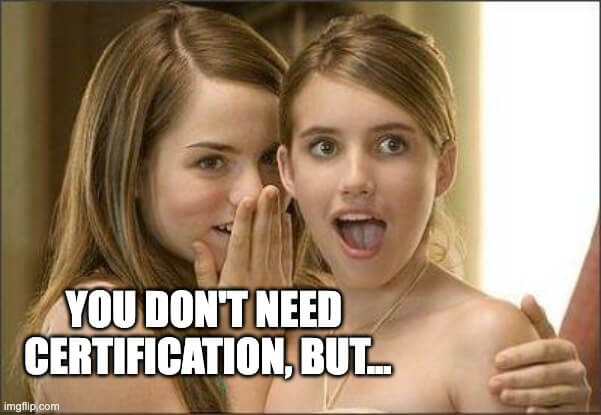
But the long answer is more complicated and worth digging into.
After reading this blog post, you’ll understand the nuances and be able to decide if you want certification or not.
The Current State of The Coaching Industry
Life coaching is a partnership that helps people achieve their personal and professional goals through structured guidance, accountability and support.
Unlike therapists or counselors who often focus on past trauma and healing, life coaches work with clients to create plans for future success.
The coaching industry has grown exponentially, with the number of certified coach practitioners worldwide jumping from 71,000 in 2019 to 109,200 in 2022, that’s a 54% increase. That number is expected to reach 145,500 active coaches in just a few years.
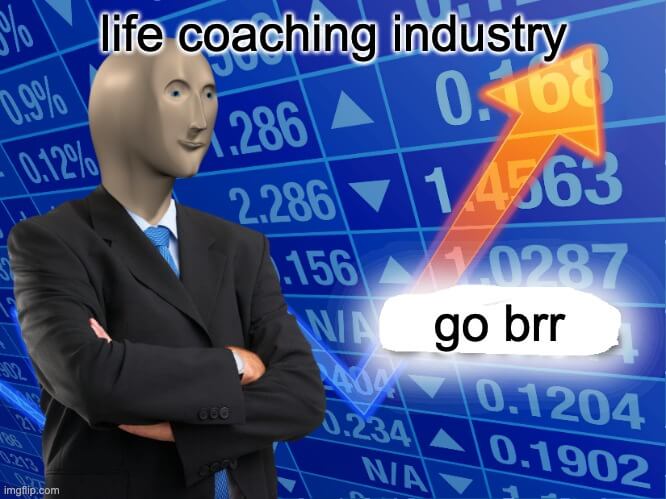
Sources:
Many people assume that, like therapists or teachers, life coaches must have special certifications to practice. This misconception often comes from the professional look of established coaches and the structure of coaching programs.
The Legal Requirements for Life Coaches
Here’s the bottom line: life coaching services is an unregulated industry in most countries. That means you can start coaching clients tomorrow without any formal certification or license.
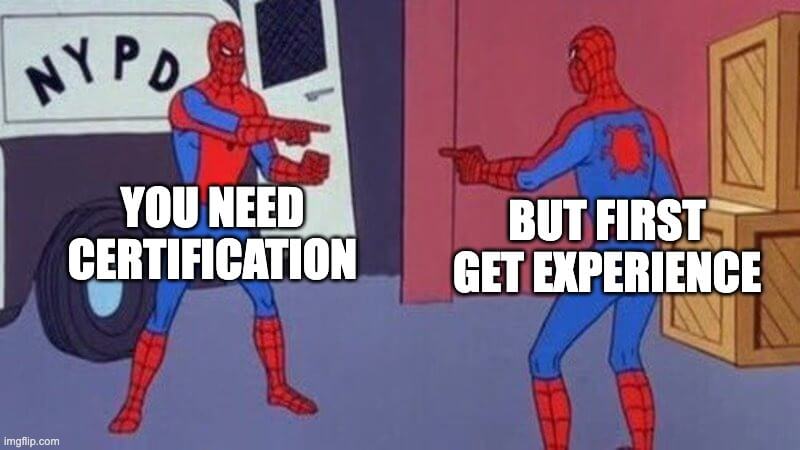
But there are some exceptions to consider.
If you plan to coach health-related or corporate clients you may need special credentials. Many companies require their coaches to have recognized certifications, especially from the International Coaching Federation (ICF). Some countries are also starting to regulate coaching practices so be sure to research the requirements in your market.
Why Get Certified for Your Coaching Business
Professional Credibility
While certification isn’t required, it offers many benefits that can fast track your coaching career. Certification shows you’re committed to the profession and gets you structured training in coaching methodologies. Many certified coaches report their credentials attract more clients and higher rates.
Networking & Resources
Beyond credibility, certification programs offer networking with other coaches and continuing education resources. Many professional liability insurance providers also prefer or require certification for coverage.
Better Coaching Skills
Getting a life coaching certification can also improve your coaching skills by exposing you to different coaching techniques and practices. This formal training will not only boost your confidence but also give you the tools to handle different client scenarios. Certification programs involve assessments and practical coaching sessions so you have hands on experience before you go into the profession.
Specialization
Being a certified life coach can also open doors to specialized coaching areas like executive coaching, health and wellness coaching or relationship coaching and allow you to niche down in the competitive coaching industry. This specialization will set you apart from other coaches and attract clients looking for specific expertise.
Personal and Professional Development
And certification can give you a sense of personal achievement and validation, prove your commitment to personal development and lifelong learning. It tells potential clients you’re serious about your coaching practice and committed to high standards of professionalism.
Overall while certification is not required, the benefits will really help your life coaching career and give you a solid foundation to build a successful life coaching business.
Certification Options
The International Coaching Federation (ICF) is the gold standard in coaching certification and offers three levels of credentials:
– Associate Certified Coach (ACC): Entry level certification requiring 60+ hours of training and 100 hours of coaching
– Professional Certified Coach (PCC): Intermediate level requiring 125+ hours of training and 500 hours of coaching
– Master Certified Coach (MCC): Highest level requiring 200+ hours of training and 2,500 hours of coaching
ICF has over 21,000 coaching practitioners worldwide so you can see the growth of certified coaches. Other certifying bodies exist but ICF certification is widely recognized and respected across industries.
Investment vs. Returns
Here’s a table including certification levels, requirements, costs, and earning potential:
ICF Certification Levels, Requirements & Earnings (2023-2024 Data)
| Certification Level | Training Required | Client Experience | Program Cost (USD) | Average Hourly Rate | Potential Annual Income |
|---|---|---|---|---|---|
| Associate Certified Coach (ACC) | 60+ hours | 100+ hours | $3,000 – $4,500 | $128 – $152 | $45,000 – $75,000 |
| Professional Certified Coach (PCC) | 125+ hours | 500+ hours | $3,500 – $13,395 | $194 – $256 | $75,000 – $140,000 |
| Master Certified Coach (MCC) | 200+ hours | 2,500+ hours | $4,200 – $8,000 | $321 – $450 | $100,000 – $300,000 |
Additional Earnings Factors
Location: North American coaches average $62,500 annually
Specialization: Executive coaches earn approximately $386/hour vs. life coaches at $190/hour
Experience Level Impact:
0-2 years: $128-152/hour
3-4 years: $194/hour
5-10 years: $256/hour
10+ years: $321+/hour
Note: Actual earnings for your life coaching practice can vary significantly based on location, specialization, business model, and market positioning.
Sources:
Starting Without Certification
Practice Clients and Experience Building
If you’re not ready to invest in certification yet, you can still start your coaching journey. Many coaches start by working with practice clients to build experience and testimonials. Focus on delivering real results and document your successes through client reviews and case studies.
Online Credibility
Having a strong online presence through social media, blogging and networking can help establish your credibility without certification. Just be transparent about your experience level and show how you can help your clients achieve their goals.
Free Workshops
Also offer free workshops or webinars to showcase your coaching skills and attract clients. These events are a way to demonstrate your expertise and connect with your audience and build rapport and trust.
Community and Learning
By joining discussion forums and groups, you can connect with other coaches and learn from one another, since different people have different background and experiences. The camaraderie in groups like these where people share the same objective also motivates you to keep growing.
Specialization
The saying “A Jack of all trades is a master of none” is very true. A life coach who coaches everybody and anybody is going to lose out to a coach who specializes in one specific area.
Example: Someone is looking to transition to a new career. Do you think he’s going to hire a general life coach or a life coach specializing in career transitions?
At the end of the day, using your real skills to help clients achieve their goals or overcome their problems is the most important thing.
Diving Deeper Into Life Coaching
Many folks get the misconception that coaches “give advice”. A coach is simply someone who facilitates clients, so that the clients themselves find their own solutions.
This is done through deep questioning and structured goal setting. You can think of the coach as a “sounding board”.
So what’s a “life” coach then?
A life coach is someone who helps others achieve their personal and/or professional goals and improve their lives.
Core Coaching Model
Clients discover their strengths and weaknesses with the help and guidance from their coach. The coach uses various techniques like visualization exercises, motivational interviewing, and accountability tracking to make sure the client’s goal is achieved.
Building the Coaching Relationship
Coaching is “human-to-human” — meaning for the coaching to work — mutual trust and respect must be present so that clients feel safe and supported as they explore new possibilities.
Otherwise, the client won’t “open up”.
And if he won’t tell you his root problems, you can’t help them no matter how good a life coach you are.

Service Delivery Models
Many people think of 1-on-1 coaching when it comes to life coaching or any type of coaching. You can also do group coaching where you help and facilitate a small group of people together.
This type of arrangement not only allows clients to learn from others experiences… the coaching cost is also less.
For you as the coach, you get to support more people while also earning a nice income. Win-win!
Professional Partnerships
Consider working with therapists, fitness trainers, and nutritionists to offer your clients a more holistic support. Remember, the #1 most important thing is to help get results for your clients. Bringing in these experts will help with that.
Business Requirements
To set up your coaching practice as a legal business entity, do these:
Create clear coaching contracts
Get liability insurance (usually $500-1,000 per year)
Create secure systems for client records
Set clear payment and cancellation policies
These basics protect you and your clients no matter your certification status.
Ethics
Ethics in coaching go beyond formal qualifications. Every coach should:
Keep Client Confidentiality
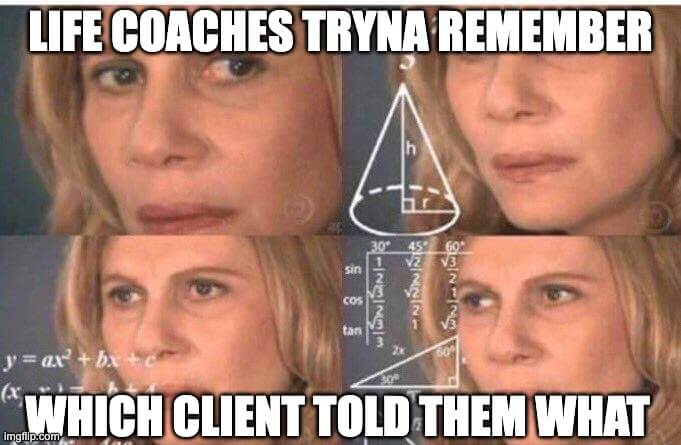
Ensuring all personal and sensitive information shared during coaching sessions is protected and not shared without client consent. This builds trust and a safe space for clients to open up.
Know When to Refer Clients to Mental Health Professionals
recognize the limits of coaching and know when a client’s needs go beyond the coaching services. This ethical responsibility means clients get the right level of care and support.
Avoid Dual Relationships (mixing business with personal relationships)
to maintain professional boundaries and avoid conflicts of interest. This keeps the coaching relationship intact and unbiased.
Practice Within Their Scope of Expertise
only offer services and advice in areas they have sufficient knowledge and experience. This prevents harm and ensures clients get good guidance.
Follow a Code of Conduct
Whether certified or not follow ethical guidelines that promote respect, integrity and professionalism in all coaching interactions. This is key to building a sustainable coaching business.
Many new coaches overlook these ethical considerations but they are essential to building a sustainable coaching business. By prioritizing ethics coaches protect their clients and their reputation in the life coaching industry. And following ethical standards means more successful coaching outcomes as clients feel more safe and supported in their coaching journey.
Success Factors
Certification doesn’t mean success in life coaching. The most successful coaches have a combination of:
Good Communication and Listening Skills
Effective coaches can understand their clients needs, ask good questions and give feedback that encourages growth. This is not just verbal communication but also non verbal cues so clients feel heard and understood.
Emotional Intelligence and Empathy
Emotional intelligence allow coaches to connect with clients on a deeper level, create a safe space for clients to explore their thoughts and feelings. Empathy helps coaches to understand client’s perspective which is key to guiding them to solutions that resonate with them.
Business and Marketing skills
A coaching business requires more than just coaching skills. Coaches must be business savvy, be able to promote themselves, manage their finances and develop a strategy to grow their business. This includes understanding their target market, creating offers, leveraging digital marketing to reach potential clients.
Ongoing Professional Development
The coaching industry is constantly evolving and the best coaches commit to lifelong learning. This can mean attending workshops, getting additional certifications and staying up to date with the latest coaching techniques and industry trends. Continuous learning not only improves coaching skills but also shows commitment to delivering the best to clients.
Coaching Communities
Being part of other coaches through forums, conferences and professional networks means collaboration, mentorship and sharing of best practices. Being in a community means personal growth and coaches stay motivated and inspired.
These skills matter more than credentials to building a successful business. Many highly successful coaches didn’t start with certification but invested heavily in developing these core competencies. By focusing on these key elements coaches can build a coaching business that not only survives but thrives in the life coaching industry.
FAQs About Certification
Let’s answer some common questions about life coach certification:
Q: How long does it take to get certified?
Most entry level certifications take 6-12 months to complete depending on your pace and chosen program.
Q: Can I start coaching while I’m working towards certification?
Yes many coaches start coaching while pursuing certification which fulfills the required coaching hours.
Q: Will clients ask about certification?
Some will especially corporate clients. But many individual clients will focus more on your track record and ability to deliver results for them.
Q: Which certification program should I choose?
The International Coaching Federation (ICF) is the leading organization when it comes to coaching. Make sure to look for ICF accredited programs.
Go For Certification or Not?
Your decision to get certified depends on your:
Long term career goals
Target market requirements
Available resources (time and money)
Experience level
Who you want to coach (health-related or corporate clients usually need to be certified)
Local laws so you avoid legal troubles
You can start coaching without certification… but with certification you’ll gain more trust, credibility, and command a higher fee.
But then again remember this: The most important thing is that your clients get results. Otherwise the best certification programs will be useless.
Getting results for clients without certification is better than having certification but no client results.
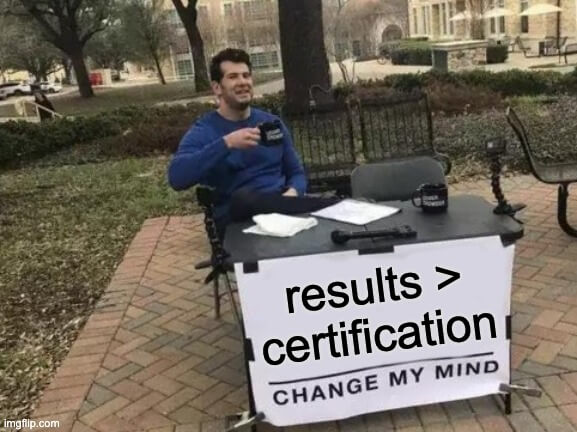
Related Reading
- Payhip vs SamCart: The Recurring Revenue Handcuffs (2026)
- SamCart vs ClickFunnels: The Recurring Revenue Hostage (2026)
- SendOwl vs ThriveCart: Which has a hidden trap in 2026?
- SendOwl vs SamCart: The Recurring Revenue Jail (2026)
- ThriveCart vs ClickFunnels: When more features hurt (2026)
- SendOwl vs Payhip: The “You-Leave-You-Lose” Model (2026)
- SamCart vs Kajabi: The Income Hostage Trap (2026)
- Sellfy vs Payhip: The Recurring Revenue Prison (2026)
- Podia vs Gumroad: The Recurring Revenue Handcuffs (2026)
- SendOwl vs Gumroad: The Recurring Revenue Black Hole (2026)
